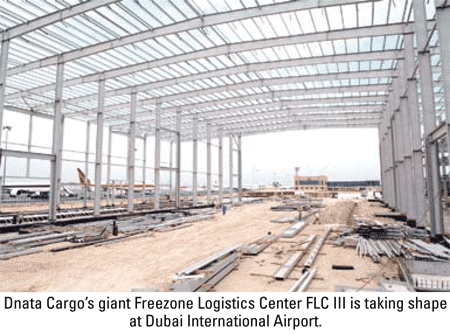FLC III, scheduled for completion in early 2007 with 16,000 square meters of warehousing and 10,000 square meters of office space, will contain Dubai's first fully-automated air cargo storage and retrieval system handling facility and a complete portfolio of 24-hour government import-export services, all under one roof.
When operational, the four-storey FLC III will extend existing FLC facilities to create a giant 47,000 square meter warehouse and office complex. It will also significantly boost storage and handling capabilities, enabling the FLC to accommodate Dnata's cargo growth until 2010.
Construction of FLC III has recently advanced, with steel framework towering alongside existing FLC buildings - FLC I, which opened in 1999 as a 9,000 square meter dedicated charter terminal for freighter operators, linking Dnata's Main Cargo Terminal (MCT) and the Airport Freezone community with flexible, cost-effective handling; and the 2003 FLC II extension, which doubled capacity. Jean Pierre L. de Pauw, Senior Vice President, Dnata Cargo, said: 'FLC III, with its vastly enlarged capacity and sophisticated fully-automated facilities, is fast becoming a reality and will transform cargo handling in Dubai.
'Airlines, agents, freight forwarders and charter operators will be able to complete their business transactions faster, with government agencies including Customs, Municipality, Health and Police located on the premises to provide round-the-clock services,' he said.
FLC III's state-of-the art cargo operating system will incorporate fully automated elevating transfer vehicles (ETV), truck docks interfaced to land and air sides, and automatic storage and retrieval systems (ASRS) to ensure a seamless flow of cargo through the building.
It will be integrated with Dnata's computerised DACS+ cargo handling system to provide customers with improved service standards, real-time information, speedy delivery, optimum utilization of space and time, and cost reduction.
Once FLC III is operational, Dnata will further streamline services by introducing its innovative web-based CALOGI customer interface portal. Linked to DACS+, CALOGI will be the first initiative connecting ground handling agents, airlines and freight forwarders directly to the end shipper and consignee.
FLC has expanded to keep pace with Dubai's relentless cargo growth and customer demand since opening in 1999 with a handful of freighter operators. By 2003 the number of FLC operators was 26, the average number of flights each month had grown to 260 and annual cargo volume had reached a record 50,000 tons, triggering the FLC II expansion which doubled capacity, extended customer facilities, and increased aircraft parking bays from 10 to 46.
Currently, the number of operators at FLC is 48, monthly flight frequency is more than 500, and annual cargo throughput exceeds 100,000 tons.
In addition to FLC throughput, Dnata also handles around 450,000 tons annually at its MCT and Express Handling Centre (EHC) in Dubai Cargo Village.
Dnata Cargo provides a broad range of products and services to meet the diverse needs of more than 100 airlines operating through Dubai International Airport, and serves 1,000 cargo agents based in Dubai. Its cargo terminals are the MCT and EHC at Dubai Cargo Village; FLC at Dubai Airport Freezone; and the Freezone Air Cargo Terminal (FACT) at Jebel Ali Freezone.











